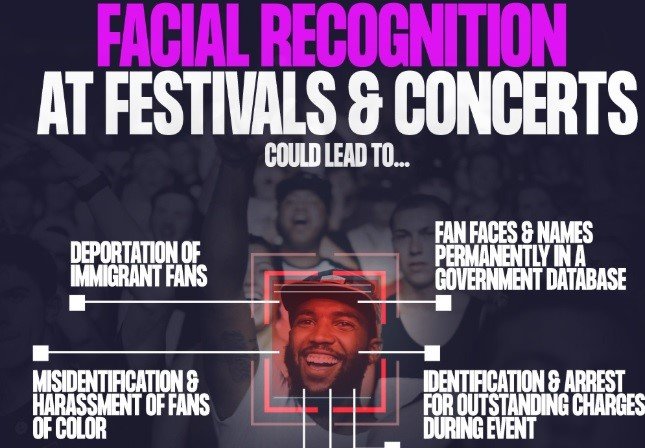Just over a year ago, Live Nation, the parent company of Ticketmaster, revealed a project to leave behind the use of physical tickets to access a concert or sporting event. In partnership with tech company Blink Identity, they planned to use facial recognition to identify concert-goers, digital forensics specialists reported.
“We are looking to invest in new technologies to make the gap between Ticketmaster and its competitors even bigger,” says the Live Nation statement announcing this project. “The technology of Blink Identity will allow us to establish a link between your face and a digital ticket, so the lines to enter a concert will be over.” Although there is no real advance on this project, and it is not yet known whether Blink’s technology is really capable of achieving it, the idea continues to gain followers within the company.
Although the idea would seem to apply technological advances for the convenience of attendees to massive events and the safety of artists, staff and the general public, experts in digital forensics mention that the use of facial recognition remains a theme controversial due to the legitimate or malicious uses that this activity could have. Last year, organizers of Taylor Swift’s US concert tour quietly used a facial recognition module to identify one of the pop star’s multiple online stalkers; despite questions about privacy, the organizers argued that this measure was taken for the protection of the singer. This type of technology also helped lead to the arrest of a wanted criminal in China, detected at a concert by popular Asian artist Jacky Cheung.
The civil organization Fight for the Future, created for the defense of digital rights, has spoken out against Live Nation’s plans to implement this technology in concerts. The organization features Tom Morello, a renowned musician and political activist, and members of the band Speedy Ortiz among its most prominent members.

According to experts in digital forensics, this association of musicians considers that it is unwise to implement facial recognition as an alternative to using a ticket, as this technology can be easily used against fans. “I have decided to join this campaign calling Ticketmaster to not continue with this project. I don’t want Big Brother to be present at my shows; fans would be exposed to harassment, deportation or arbitrary arrests,” said Tom Morello via his Twitter account.
A representative of Fight for the Future stated: “Attendees of these kinds of events should feel safe, not exposed to systemic surveillance. Facial recognition is one of the most intrusive surveillance techniques; it allows any person’s tracking in the middle of a crowd under discriminatory criteria”.
It’s not just private companies with plans for facial recognition implementation. According to digital forensics experts from the International Institute of Cyber Security (IICS), the London Metropolitan Police has also been collaborating in the creation of databases for facial recognition. Moreover, in the US, President Trump’s administration plans to make this technology a standard for any airport or border crossing.

He is a well-known expert in mobile security and malware analysis. He studied Computer Science at NYU and started working as a cyber security analyst in 2003. He is actively working as an anti-malware expert. He also worked for security companies like Kaspersky Lab. His everyday job includes researching about new malware and cyber security incidents. Also he has deep level of knowledge in mobile security and mobile vulnerabilities.











